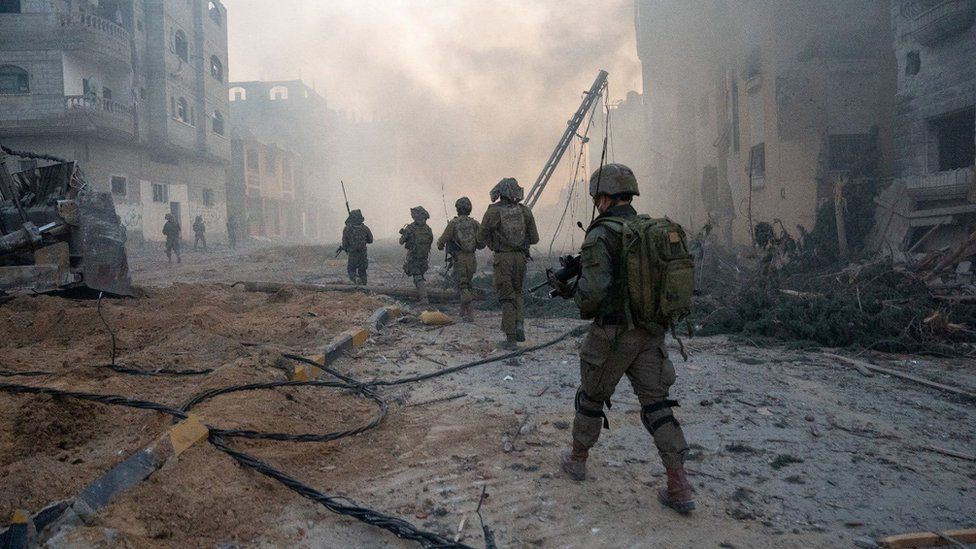ARTICLE AD BOX
 Image source, Reuters
Image source, Reuters
Israel's offensive is currently focused on southern Gaza
By Mark Lowen
BBC News, Jerusalem
More than 25,000 people have now been killed in Gaza since Israel's offensive began, according to the Hamas-run health ministry.
It said there had been 178 deaths in the last 24 hours, making it one of the deadliest days in the war so far.
As fighting continued, Israel's Prime Minister Benjamin Netanyahu again rejected creating a Palestinian state.
The White House has said the US and Israel "clearly see things differently" when it comes to a two-state solution.
Israel began its offensive following the 7 October attack in which Hamas fighters killed 1,300 people in southern Israel and took more than 240 hostage.
The air and ground operation - which Israel says is aimed at destroying Hamas - is currently focusing its offensive on southern Gaza, where it is convinced top Hamas commanders are holed up in, or beneath, the city of Khan Younis.
That is where the Israeli military said it had discovered another tunnel, some 830m (2,700ft) long and containing booby-traps and blast doors.
Israel Defense Forces (IDF) footage showed what appeared to be a tunnel with mattresses and cells inside - it is where Israel believes around 20 Israeli hostages, including children, were held at various points. None were found when the tunnel was discovered, though.
Israeli soldiers have also faced renewed attacks in the north of the Gaza Strip, where Hamas is said to have seized an opening around the town of Jabalia as Israel moved troops and tanks south.
More than three months since the conflict erupted, Israel - whose army far outstrips Hamas' capabilities - is still facing significant resistance across Gaza.
US intelligence agencies reportedly estimate that the Israeli military has killed 20-30% of Hamas fighters, which falls far short of Prime Minister Benjamin Netanyahu's stated aim of "completely destroying" the armed group.
The classified report is also said to have found that Hamas still has enough munitions to continue striking Israel and Israeli forces for months, raising the spectre of a prolonged war in which Israel could get bogged down.
The apparent slow progress, the fact no top Hamas commander has yet been captured or killed, and the collective trauma over the 130 or so Israeli hostages still missing, is prompting growing anti-government anger in Israel.
Hamas killed about 1,300 people - mostly civilians - and took 240 others hostage in their surprise attack on southern Israel on 7 October.
Protests are continuing by relatives of those still held by Hamas, calling for Mr Netanyahu to prioritise their release over the potentially impossible aim of destroying Hamas. And a still relatively small anti-war movement is also demonstrating, horrified by the damage wrought on Gaza - one of the most intense and destructive military campaigns in recent history.
Most Israelis have rallied around their flag - but not around their prime minister, who, according to a recent poll, only 15% of the public believe should stay in office once the war ends.
How it does end is the subject of growing disagreement between Mr Netanyahu and Israel's western allies. After speaking to US President Joe Biden for the first time in almost a month, the Israeli prime minister reiterated his rejection of a future Palestinian state.
In a post on X - formerly Twitter - he said Israel must retain "security control over the entire area west of [River] Jordan", which also encompasses the Israeli-occupied West Bank territory.
Mr Netanyahu has been fiercely opposed to a Palestinian state throughout his political career. But by repeatedly asserting it now, an increasingly unpopular prime minister appears to be doubling down on a view that he feels chimes with the majority opinion in a nation too horrified by the attacks to countenance an independent Palestinian state.
His apparent fight for political survival is clashing with exasperated Israeli allies, who hope that the current bloodshed could force both sides into meaningful diplomacy over a sustainable two-state solution.
UK Defence Secretary Grant Shapps told the BBC earlier that Mr Netanyahu's stance was "disappointing". The White House has said the US and Israel "clearly see things differently".
Antonio Guterres, secretary-general of the United Nations, went further, calling the refusal to accept a Palestinian state "completely unacceptable". He added it "would indefinitely prolong a conflict that has become a major threat to global peace and security".

 1 year ago
83
1 year ago
83








 English (US) ·
English (US) ·